
NF X 15-211 Ductless fume hoods - Filtering safety cabinets - Ventilation



WHY USE A DUCTLESS FUME HOOD?
When you handle chemicals, your health can be put at risk by the release of noxious or even toxic vapours or powders. To protect yourself and your immediate environment, you should handle your products in an air recirculation fume hood (formerly known as a filtered air recirculation toxic enclosure or FACRE) fitted with either a molecular filter (or activated carbon filter), a particulate filter (or HEPA filter), or a molecular filter and a particulate filter.
WHY CHOOSE A LABOPUR® DUCTLESS FUME HOOD?
Made in France, Labopur® fume hoods are manufactured and finished to the highest quality standards, in accordance with processes and procedures based on the ISO 9001 version 2008 quality standard.
What's more, our expertise has been successfully tested by independent French laboratories and inspection bodies in accordance with the May 2009 version of standard NF X 15.211.
CERTIFICATION
The performance of labopur® ductless fume hoods has been assessed against standard NF X 15-211 - May 2009 by French laboratories and inspection bodies for :
- Filtration tests.
- Containment tests.
- Tightness and integrity tests on the absolute filter (HEPA filter).
labopur® filtration fume hoods are manufactured according to Quality processes and procedures defined on the basis of the international standard ISO 9001 version 2008, at the end of the production line and before dispatch, in order to guarantee perfect operation and efficiency for the user.
STANDARDISATION
![]()
NF X 15-211 standard - May 2009:
The NF X 15-211 standard is the most demanding regulation currently in force. It guarantees users enhanced safety, allowing them to concentrate on their work.
Toxic enclosures with filtered air recycling are classified according to 2 safety levels:
class 1: enclosure with safety reserve (2 activated carbon filters per filtration column)
class 2: enclosure without safety reserve, the most commonly used enclosure (only 1 activated carbon filter per filtration column).
Standard NF X 15-211 also distinguishes 3 classifications according to the type of filtration, depending on the chemical agents filtered:
type P: for particle filtration (only available for class 2).
type V: for vapour filtration (available for classes 1 and 2).
type PV: for particle and vapour filtration
(available for classes 1 and 2).
labopur® ductless fume hood are filtration chambers.
Depending on the model, class 1 ductless fume hoods can be fitted with one particle filter and two activated carbon filters, or with only two activated carbon filters per filtration column.
Class 2 can, depending on the model, be fitted with one particle filter or one activated carbon filter, or with one particle filter and one activated carbon filter per filtration column.
Labopur® fume hoods can be fitted with 1 to 4 filtration columns, depending on the model.
To comply with this standard, Labopur® filtration hoods must meet a number of criteria (summary):
- The fume hood must be fitted with a ventilation device (for continuous monitoring of the system) to maintain the air speed at between 0.4 m/s and 0.6 m/s (class 1 and class 2).
- The enclosure's filtration system must ensure that the discharge concentration downstream of the filter(s) does not exceed 50% of the OELV (Occupational Exposure Limit) for the toxic substance handled in the enclosure, for the duration of the detection operation.
- Fume hoods must have been tested by an approved independent laboratory.
- Class 2 fume hoods must have an audible or visual alarm triggered by a timer every 60 hours of operation and a sampling device.
- Class 1 fume hoods must be equipped with an automatic device for monitoring and detecting saturation of the main activated carbon filter and a second activated carbon filter in reserve.
- Class 1 fume hoods must not discharge more than 1% of the TLV of the product handled downstream of the activated carbon filter during the detection operating time.
- Class 2 fume hoods must not discharge more than 50% of the TLV of the product handled downstream of the filter during the detection operating time.
New classification of ductless fume hoods in accordance with prEN 17242 :
Classification into 3 parts as follows:
X (general type of application) / Y (filter class) / Z (monitoring arrangement)
Details are given below.
X: General type of application:
Class A: RFFC with integrated filters;
Class B: RFFC with associated filters.
Y: Filters:
1: particulate filter only;
2: gas and vapour filter only;
3: particulate and gas and vapour filters;
4: other filtration devices or arrangements, including those for RFFCs with internal filters.
Z: Filter monitoring devices:
0: no filter condition monitoring devices;
1: integrated continuous filter condition monitoring devices applicable to the filter application. EXAMPLE
Examples of the designation of an RFFC with integrated particulate and chemical filters and continuous filter condition monitoring: Class A / 3 / 1 .
-
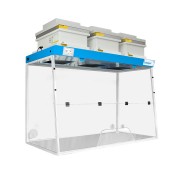
NF X 15-211 Ductless fume hoods - Classe I -
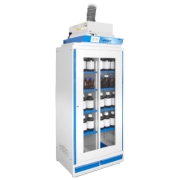
Ventilated cabinets for external connection -

primo ventilation-filter cabinets -
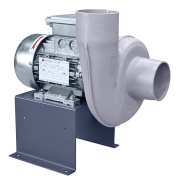
ATEX RADIAL volute fan -
.jpg)
NF X 15-211 Ductless fume hoods - Classe II -
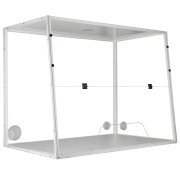
Fume hoods with external connection -
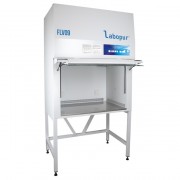
Laminar flow clean benches, vertical -
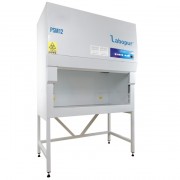
Biological safety cabinets - Class 2 -
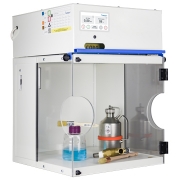
NF X 15-211 Mini-ductless fume hood -
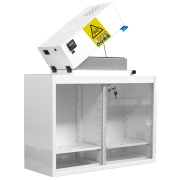
Filtering ventilation safety cabinet on bench or wall mounted -
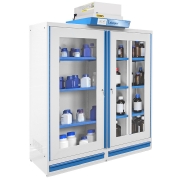
Filtering ventilation safety cabinets -
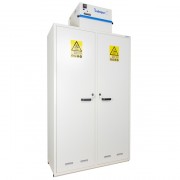
Filtering ventilation safety cabinets -
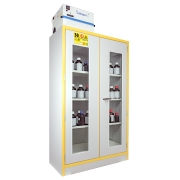
EN 14470-1 filtering ventilation safety cabinets Type 30 -
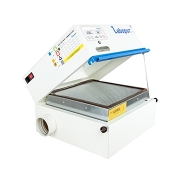
Recycling air box Labopur -
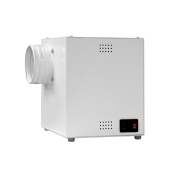
Ventilation and filtration boxes